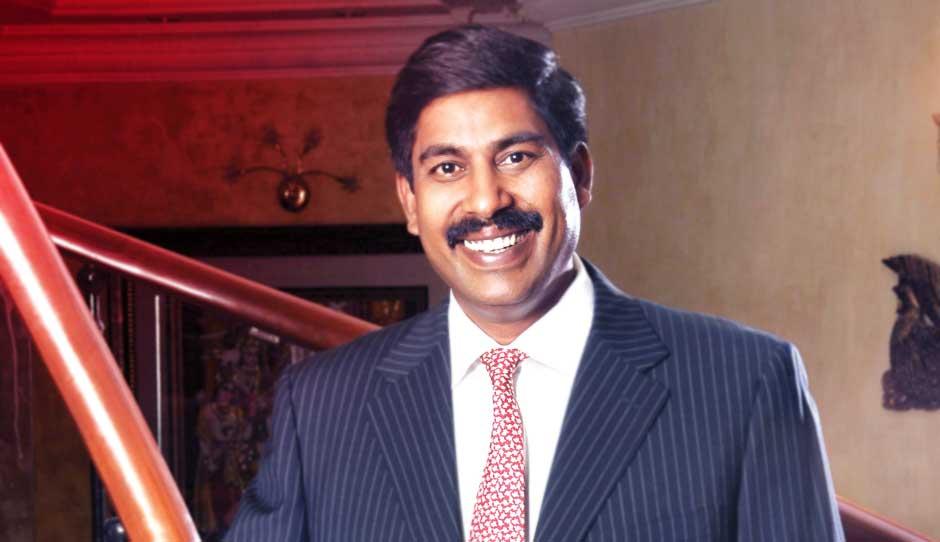Sweet Smell of Success
- BY Sonal Khetarpal
 In Operations
In Operations 13083
13083 0
0

For Sai Ramakrishna Karuturi, life is quite literally a bed of roses as the world’s largest producer of the beautiful, red flower. A mechanical engineer by training, Karuturi began his company with Rs 5 crore and three employees in 1994. Cut to today where just in the last quarter, Karuturi Global’s revenues were Rs 633 crore. The company produces 650 million rose stems annually and exports 1.5 million every day, mostly from their farms in Ethiopia and Kenya. Now, Karuturi is hoping his new focus—agriculture—will reap even greater harvests. He’s acquired vast tracts of land in Africa, and aims to produce three million tonnes of food annually by 2020.
Entrepreneurship runs in my blood. My father, Surya Rao Karuturi, was a first-generation entrepreneur who started as a small rice trader, went on to become a large-scale farmer and eventually became a manufacturer of cable and transmission towers. While growing up in Bengaluru, I was greatly influenced by him. His foresight and never-say-die attitude have been my inspiration all along.
I always knew I would join the family business. After graduating in mechanical engineering from Bangalore University in 1988, I went to Case Western Reserve University in the US to pursue an MBA. Back to India in 1990, I joined the business as technical director. It was a great experience; I was young and full of dreams. I really worked hard at Deepak Cables (India) Ltd, the family-owned power transmission towers business. Entering into the Far-Eastern market was one of the decisions I took there.
Chancing upon a rose garden was a serendipitous moment for me. After working at Deepak Cables for four years, I had started feeling the need to do something else. I took a break and visited Israel to explore new transmission tower business opportunities. For some time, I had wanted to build greenhouses so that we could combine our power tower business with our large agricultural assets. I was not prepared for what was going to come next. When I went to see greenhouses in Israel, I was struck by the variety of roses being cultivated. It was a fascinating sight, and I couldn’t get it out of my mind even after I returned home from that trip. I was so struck by it that I decided to take up rose cultivation in India. I spent nearly one-and-a-half years just researching how to grow roses.Even today, I cannot forget the day when I saw a Boeing 737, take off from Bengaluru airport with our homegrown roses. It was surreal, almost.”
[image_library_tag 3843d763-f8fb-4856-a283-062433df3b91 300x200 alt=" looming rofits oing to fricaand buying tracts of land to produce roses in thiopia and enyawas the main turning point for aruturi lobal" width="300" ] Blooming Profits: Going to Africa—and buying tracts of land to produce roses in Ethiopia and Kenya—was the main turning point for Karuturi Global.
My family was sceptical. They thought it was a momentary fancy and would soon pass. But I was certain that I wanted to be in the business of roses. I was in love with them and nothing could stop me from fulfilling my dream. At that point I didn’t think how it would turn out or whether I would succeed at all.
Our cultivation beginnings were humble. I acquired 18.6 acres of land outside Bengaluru and started growing roses on it. Karuturi Floritech was incorporated in 1994 and was renamed Karuturi Global in 2004, when we entered Africa. I invested Rs 5 crore, part of which was loaned from a bank. Our turnover was in the range of Rs 2-3 crore in the first year itself. I had grown nine varieties of roses. At that time, most other cultivators were importing roses from Netherlands, because of which the costs were high. Our roses were all homegrown, and we managed to cut costs by almost 30 per cent because of that. We were the lowest cost farm in Bengaluru when we set up. Unlike other farms in the area, we didn’t have too many fancy equipment or high overhead costs. We were producing roses with limited resources at a very low price. In fact, when the vice president of a bank visited our farm, he called it “primitive”. I wasn’t offended. It was a compliment.
I dreamt really big. In the mid-90s, the flower export market was in the early stages. We didn’t have the wherewithal to compete with the international market and nobody expected that India could be successful one day. But I had a gut feeling that we could be big. I knew it was about hanging in there. We began to expand. Between 1996-2000, we developed Singapore, Australia, Middle-East and Japan as our markets. These were not traditionally on the radar of big flower cultivators but it was a good time to go global and tap these markets. Markets across the world were on an upswing and people were spending more. We were successful in most markets we entered other than South Africa. That didn’t work though—somehow we didn’t find too many buyers in the South African market.
It’s not like business was a bed of roses. Yes, we were growing but we faced our share of challenges. Ironically, we found success in these challenges. In February 1999, just before Valentine’s Day, the flight taking our roses to Europe was cancelled. Other local rose cultivators panicked and sold their produce at whatever price they could fetch. I bought all their roses, negotiated for a flight to Europe from Chennai and sent the consignment of roses by road to Chennai. I had bought the flowers for Rs 4 per piece and sold them on Valentine’s Day for Rs 48 per stem. Similarly, in 2007-08, when Kenya erupted in violence and it was tough to find labour for the farms, I refused to abandon my operations. Instead I continued with rose cultivation, exporting nearly a million roses annually. I provided housing, food and blankets to over 6,000 labourers and children in schools and hospitals that were part of the company’s complex.
Even today, I cannot forget the day when I saw a Boeing 737, take off from Bengaluru airport with our homegrown roses. It was surreal, almost.”
By 2000, I had set up the Indian market, and was doing well in other global markets. Our turnover now was Rs 12-13 crore. Around then, I managed a personal coup of sorts. I started a chartered flight from Bengaluru which began flying out roses to Amsterdam. It was a major decision for us. We were still small players in the business but it meant a lot to me. Even today, I cannot forget the day when I saw a Boeing 737 take off from Bengaluru airport with our homegrown roses. It was surreal, almost. It marked a turning point in the business. Today, we operate several chartered flights every week to ship our roses to Netherlands, the hub of Europe’s flower business.
Things were going fine with the business. But, slowly, it was clear that the biggest threat to our business was competition from Africa. My best people started leaving for cultivators in Africa. Sometime in 2004, an employee of mine, and somebody I consider a guru, told me I should look at Africa as a potential base for rose cultivation. He had left Karuturi to work for an African company. I laughed off his suggestions at first. But later as we were driving to our farm outside Bengaluru, he kept at it. And, the facts he listed—high yield of roses and high profits—were astounding. I was stunned by the potential for what Africa could do for us. I immediately turned back to Bengaluru and booked myself on the first available flight to Africa.
It was the second turning point for Karuturi Global. Once there, I discovered how they were miles ahead of us. Their air freight was cheaper; they had duty-free access to Europe and were shipping roses round the year. Their scale of operations was phenomenal. On the other hand, we were playing to the seasons. We moved from one season to another, from one country to another. We were moving between six markets in a year and as a result, there was no stickiness with the brand. That made me enter the Africa market. By then, I knew what I wanted. I had to be the rose grower for the world.
A bit of prudence and pragmatism paid. It wasn’t easy to break into a world inhabited by seasoned players. The African growers saw me as a Johnny-come-lately breaking into their stronghold. I decided against going to Kenya, where all the major rose growers were. Instead, I went to Ethiopia where the government was offering free land and cheaper air freights. Once we got a foothold in the African market, we bought large farms in Kenya. We bought 188 hectares for $67 million in Kenya to take on the global competition. In the last seven years, we have grown to become the world’s largest producer of cut roses with an annual production of 650 million stems. We export 1.5 million roses every day.
I don’t have much of an appetite for taking risks. People tell me that I took risks when I decided to set up farms in Africa. But I don’t see it that way. I felt that I was going into a market where my overhead costs would be much less and I would gain access to the world market. I am not scared of perceived risks but of actual ones. Business can throw up some very tough times. For example, last year, we lost our maize crop and incurred a loss of $15 million due to flash floods in Ethiopia. You have to take it in your stride. I’ve always believed that when it’s high tide, you’ve got to sail and when the tide is low, you’ve got to make sure that you don’t get sand-banked.Most of all, it’s important to look after one’s employees. I started with only three. Today, there are 10,000 across our offices in Africa, India, Holland and Dubai. Soon, we are looking at increasing that to 25,000. Essentially, everybody is a human being first and so it’s important to relate to them at that level. There’s nothing that a smile can’t solve.
Over the last year or so, I realised there aren’t too many peaks left to conquer in the rose business. I have diversified into agriculture. We have leased 3,000 sq km land in Ethiopia and are growing rice, maize, sugarcane and palm oil. In total, we have 100,000 hectares of land in Africa. By 2014, I plan to acquire a million hectares. And, produce three million tonnes of food by 2020. My vision is to help convert Africa into the food basket of the world.
Expanding in India is also a priority. We started a food processing business plant at Tumkur, 85 kms from Bengaluru. It has a capacity of 6,000 tonnes per annum and we are processing and bottling gherkins for exports to Europe and the US. I hope to be a substantial player in the global gherkin market soon. We’ve have acquired a flower retail chain Florista and renamed it Flower Express. We operate 25 stores across India, and are in the process of opening 50 more. In addition, we have entered into a public-private partnership with the government of Karnataka to manage 1,500 acres of farmland for a long-term lease to grow vegetables for its captive consumption.
As an entrepreneur, you can’t let yourself perish. You have to be at it—that’s my sole philosophy. When things get really tough, they egg you on to be better and more successful. I’m very competitive that way. In hindsight, being perennially paranoid has helped. It’s that level of passion you bring to what you do that I think differentiates the successful from the also-rans.





























Add new comment